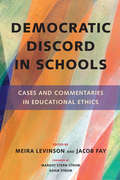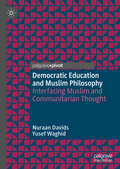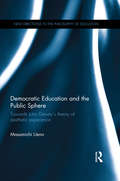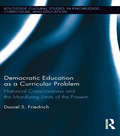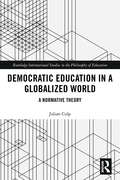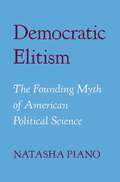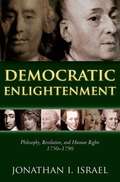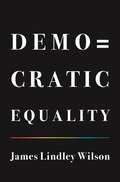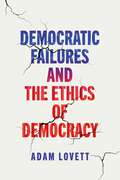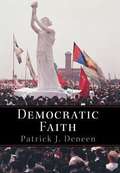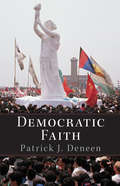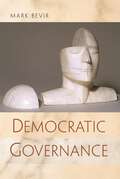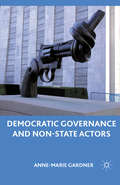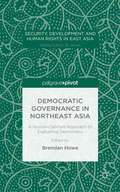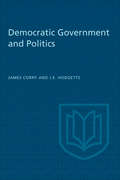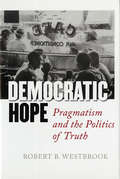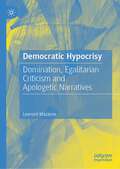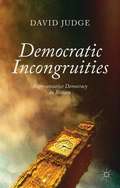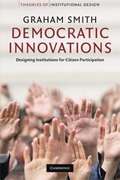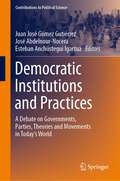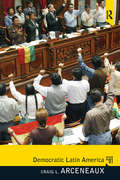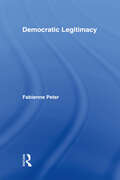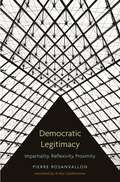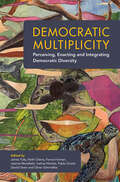- Table View
- List View
Democratic Deliberation in Deeply Divided Societies
by Juan E. Ugarriza Didier CaluwaertsThrough case-analysis and cross-sectional assessment of eleven countries this collection explores the most deeply divided societies in the world in order to highlight what deliberative democracy looks like in a deeply divided society and to understand the conditions that deliberative democracies could realistically emerge in difficult circumstances
Democratic Discord in Schools: Cases and Commentaries in Educational Ethics
by Meira Levinson and Jacob FayTeaching in a democracy is challenging and filled with dilemmas that have no easy answers. For example, how do educators meet their responsibilities of teaching civic norms and dispositions while remaining nonpartisan? Democratic Discord in Schools features eight normative cases of complex dilemmas drawn from real events designed to help educators practice the type of collaborative problem solving and civil discourse needed to meet these challenges of democratic education. Each of the cases also features a set of six commentaries written by a diverse array of scholars, educators, policy makers, students, and activists with a range of political views to spark reflection and conversation. Drawing on research and methods developed in the Justice in Schools project at the Harvard Graduate School of Education (HGSE), Democratic Discord in Schools provides the tools that allow educators and others to practice the deliberative skills they need in order to find reasonable solutions to common ethical dilemmas in politically fraught times.
Democratic Education and Muslim Philosophy: Interfacing Muslim and Communitarian Thought
by Nuraan Davids Yusef WaghidThis book examines how democratic education is conceptualised by exploring understandings of emotions in learning. The authors argue that emotion is both an embodiment and enhancement of democratic education: that rationality and emotion are not separate entities, but exist on a continuum. While democratic education would not exist if it were incommensurate with reason, making judgements about the human condition could not happen without invoking emotion. Synthesising Muslim scholarship with the perspectives of the Western world, the book draws on scholars such as Ibn al-Arabi, Ibn Sina (Avicenna) and Fazlur Rahman to offer an enriched and expanded notion of democratic education. This engaging and reflective work will be of interest and value to students and scholars of educational philosophy and cultural studies.
Democratic Education and the Public Sphere: Towards John Dewey’s theory of aesthetic experience (New Directions in the Philosophy of Education)
by Masamichi UenoThis book considers John Dewey’s philosophy of democratic education and his theory of public sphere from the perspective of the reconstruction and redefinition of the dominant liberalist movement. By bridging art education and public sphere, and drawing upon contemporary mainstream philosophies, Ueno urges for the reconceptualization of the education of mainstream liberalism and indicates innovative visions on the public sphere of education. Focusing on Dewey’s theory of aesthetic education as an origin of the construction of public sphere, chapters explore his art education practices and involvement in the Barnes Foundation of Philadelphia, clarifying the process of school reform based on democratic practice. Dewey searched for an alternative approach to public sphere and education by reimagining the concept of educational right from a political and ethical perspective, generating a collaborative network of learning activities, and bringing imaginative meaning to human life and interaction. This book proposes educational visions for democracy and public sphere in light of Pragmatism aesthetic theory and practice. Democratic Education and the Public Sphere will be key reading for academics, researchers and postgraduate studies in the fields of the philosophy of education, curriculum theory, art education, and educational policy and politics. The book will also be of interest to policy makers and politicians who are engaged in educational reform.
Democratic Education as a Curricular Problem: Historical Consciousness and the Moralizing Limits of the Present (Routledge Cultural Studies in Knowledge, Curriculum, and Education)
by Daniel FriedrichBy repositioning democratic education not as something that can be achieved by following a certain, proven process, but as an inherently paradoxical enterprise in its dealings with the tension between schooling as the intentional production of citizens and the uncertainties of democracy, an alternative way of reading the curriculum emerges. This book aims not at arriving at the right combination of theory, policy and praxis that will provide the democratic utopia, but at historicizing the discourses that have shaped the ways in which we think and act in the field of education.
Democratic Education in a Globalized World: A Normative Theory (Routledge International Studies in the Philosophy of Education)
by Julian CulpDue to the economic and social effects of globalization democracy is currently in crisis in many states around the world. This book suggests that solving this crisis requires rethinking democratic education. It argues that educational public policy must cultivate democratic relationships not only within but also across and between states, and that such policy must empower citizens to exercise democratic control in domestic as well as in inter- and transnational politics. Democratic Education in a Globalized World articulates and defends democratic conceptions of global citizenship education and educational justice on the basis of a democratic understanding of global justice. It will be of interest to researchers across the fields of education, political theory, philosophy, development and postcolonial studies.
Democratic Elitism: The Founding Myth of American Political Science
by Natasha PianoA searing argument—and work of meticulous scholarship—about how American political scientists misinterpreted the elite theory of democracy and in so doing made our political system vulnerable to oligarchic takeover.Do competitive elections secure democracy, or might they undermine it by breeding popular disillusionment with liberal norms and procedures? The so-called Italian School of Elitism, comprising Vilfredo Pareto, Gaetano Mosca, and Robert Michels, voiced this very concern. They feared that defining democracy exclusively through representative practices creates unrealistic expectations of what elections can achieve, generating mass demoralization and disillusionment with popular government.The Italian School’s concern has gone unheeded, even as their elite theory has been foundational for political science in the United States. Democratic Elitism argues that scholars have misinterpreted the Italians as conservative, antidemocratic figures who championed the equation of democracy with representative practices to restrain popular participation in politics. Natasha Piano contends not only that the Italian School’s thought has been distorted but also that theorists have ignored its main objective: to contain demagogues and plutocrats who prey on the cynicism of the masses. We ought to view these thinkers not as elite theorists of democracy but as democratic theorists of elitism.The Italian School’s original writings do not reject electoral politics; they emphasize the power and promise of democracy beyond the ballot. Elections undoubtedly are an essential component of functioning democracies, but in order to preserve their legitimacy we must understand their true capacities and limitations. It is past time to dispel the delusion that we need only elections to solve political crises, or else mass publics, dissatisfied with the status quo, will fall deeper into the arms of authoritarians who capture and pervert formal democratic institutions to serve their own ends.
Democratic Enlightenment: Philosophy, Revolution, and Human Rights 1750-1790
by Jonathan IsraelRunning counter to mainstream thinking, Jonathan Israel presents a radical account of the late Enlightenment highlights forgotten currents and figures. He demonstrates how a group of philosophe-revolutionnaires provided the intellectual powerhouse of the French Revolution, and how their ideas connect with modern Western democracy.
Democratic Equality
by James Lindley WilsonDemocracy establishes relationships of political equality, ones in which citizens equally share authority over what they do together and respect one another as equals. But in today's divided public square, democracy is challenged by political thinkers who disagree about how democratic institutions should be organized, and by antidemocratic politicians who exploit uncertainties about what democracy requires and why it matters. Democratic Equality mounts a bold and persuasive defense of democracy as a way of making collective decisions, showing how equality of authority is essential to relating equally as citizens.James Lindley Wilson explains why the US Senate and Electoral College are urgently in need of reform, why proportional representation is not a universal requirement of democracy, how to identify racial vote dilution and gerrymandering in electoral districting, how to respond to threats to democracy posed by wealth inequality, and how judicial review could be more compatible with the democratic ideal. What emerges is an emphatic call to action to reinvigorate our ailing democracies, and a road map for widespread institutional reform.Democratic Equality highlights the importance of diverse forms of authority in democratic deliberation and electoral and representative processes—and demonstrates how that authority rests equally with each citizen in a democracy.
Democratic Failures and the Ethics of Democracy (Democracy, Citizenship, and Constitutionalism)
by Adam LovettIn Democratic Failures and the Ethics of Democracy, political philosopher Adam Lovett argues that when it comes to democratic ideals, the United States is a failed democracy. Specifically, he contends that American democracy has failed to advance equality and self-rule for its citizens—qualities he identifies as essential components of democracy’s intrinsic value. Drawing on rich empirical research, Lovett applies original philosophical analysis to reveal real-world democratic failures and evaluate their philosophical and ethical consequences.His research locates democratic failures at both the level of political elites and at the level of the masses. At the elite level, elected officials shape policy to prioritize the interests of their supporters, where wealthy individuals and corporations are the most influential. At the mass level, ordinary citizens are motivated to vote not to introduce specific policies but by party identification. By mapping how these failures erode equality and self-rule, he demonstrates that they in fact undermine the ethics of democracy itself. After all, Lovett argues, when a state fails to represent ordinary citizens, those ordinary citizens are not morally obligated to follow the laws of the state.Because the state fails to achieve democratic values in any meaningful way, its claim to political authority and legitimacy is diminished. However, Lovett does not conclude that American democracy is doomed—he instead proposes solutions from voting only on referendums to delegating aspects of public policy to unelected experts without partisan obligation. These reforms are vital for compelling the state to act on behalf of all citizens, not just the partisan or the powerful. Of interest to political scientists and political philosophers alike, Democratic Failures and the Ethics of Democracy sheds light on an increasingly troubled democratic ethos and proposes solutions for how ordinary citizens can work to save it.
Democratic Faith
by Patrick J. DeneenThe American political reformer Herbert Croly wrote, "For better or worse, democracy cannot be disentangled from an aspiration toward human perfectibility." Democratic Faith is at once a trenchant analysis and a powerful critique of this underlying assumption that informs democratic theory. Patrick Deneen argues that among democracy's most ardent supporters there is an oft-expressed belief in the need to "transform" human beings in order to reconcile the sometimes disappointing reality of human self-interest with the democratic ideal of selfless commitment. This "transformative impulse" is frequently couched in religious language, such as the need for political "redemption." This is all the more striking given the frequent accompanying condemnation of traditional religious belief that informs the "democratic faith." At the same time, because so often this democratic ideal fails to materialize, democratic faith is often subject to a particularly intense form of disappointment. A mutually reinforcing cycle of faith and disillusionment is frequently exhibited by those who profess a democratic faith- in effect imperiling democratic commitments due to the cynicism of its most fervent erstwhile supporters. Deneen argues that democracy is ill-served by such faith. Instead, he proposes a form of "democratic realism" that recognizes democracy not as a regime with aspirations to perfection, but that justifies democracy as the regime most appropriate for imperfect humans. If democratic faith aspires to transformation, democratic realism insists on the central importance of humility, hope, and charity.
Democratic Faith (New Forum Books #36)
by Patrick DeneenThe American political reformer Herbert Croly wrote, "For better or worse, democracy cannot be disentangled from an aspiration toward human perfectibility." Democratic Faith is at once a trenchant analysis and a powerful critique of this underlying assumption that informs democratic theory. Patrick Deneen argues that among democracy's most ardent supporters there is an oft-expressed belief in the need to "transform" human beings in order to reconcile the sometimes disappointing reality of human self-interest with the democratic ideal of selfless commitment. This "transformative impulse" is frequently couched in religious language, such as the need for political "redemption." This is all the more striking given the frequent accompanying condemnation of traditional religious belief that informs the "democratic faith.? At the same time, because so often this democratic ideal fails to materialize, democratic faith is often subject to a particularly intense form of disappointment. A mutually reinforcing cycle of faith and disillusionment is frequently exhibited by those who profess a democratic faith--in effect imperiling democratic commitments due to the cynicism of its most fervent erstwhile supporters. Deneen argues that democracy is ill-served by such faith. Instead, he proposes a form of "democratic realism" that recognizes democracy not as a regime with aspirations to perfection, but that justifies democracy as the regime most appropriate for imperfect humans. If democratic faith aspires to transformation, democratic realism insists on the central importance of humility, hope, and charity.
Democratic Governance
by Mark BevirDemocratic Governance examines the changing nature of the modern state and reveals the dangers these changes pose to democracy. Mark Bevir shows how new ideas about governance have gradually displaced old-style notions of government in Britain and around the world. Policymakers cling to outdated concepts of representative government while at the same time placing ever more faith in expertise, markets, and networks. Democracy exhibits blurred lines of accountability and declining legitimacy. Bevir explores how new theories of governance undermined traditional government in the twentieth century. Politicians responded by erecting great bureaucracies, increasingly relying on policy expertise and abstract notions of citizenship and, more recently, on networks of quasi-governmental and private organizations to deliver services using market-oriented techniques. Today, the state is an unwieldy edifice of nineteenth-century government buttressed by a sprawling substructure devoted to the very different idea of governance--and democracy has suffered. In Democratic Governance, Bevir takes a comprehensive look at governance and the history and thinking behind it. He provides in-depth case studies of constitutional reform, judicial reform, joined-up government, and police reform. He argues that the best hope for democratic renewal lies in more interpretive styles of expertise, dialogic forms of policymaking, and more diverse avenues for public participation.
Democratic Governance and Non-State Actors
by Anne-Marie GardnerThis book investigates whether international standards of good governance are applied to sub-state actors as well as to states. By examining the international response to self-determination claims, this project demonstrates that the international community does indeed hold sub-state groups accountable to such standards.
Democratic Governance in Northeast Asia: A Human-centred Approach To Evaluating Democracy (Security, Development And Human Rights In East Asia Ser.)
by Brendan HoweComprising case studies of Japan, South Korea, and Taiwan, this edited volume explores the key characteristics of democratic governance in Northeast Asia. Each democracy is assessed on the extent to which it enables the flourishing of social capital; prioritizes the interests of all as characterized by freedom from fear and want; and empowers all to participate in the democratic process and governance. With particular focus on the experience of minorities, this volume contends that the acid test of democratic governance is not how well the government represents the interests of the elites, or even the majority, but rather how it cares for the needs of vulnerable groups in society.
Democratic Government and Politics: Third Revised Edition
by James Corry John HodgettsCompletely revised and enlarged edition (1951) of a book which has become a standard work on comparative government. This edition brings up to date the material on institutions and practices of government in Britain, the United States, and Canada, and analyses more fully the relationship of democratic institutions and practices to the essentials of the democratic creed.
Democratic Hope: Pragmatism and the Politics of Truth
by Robert B. Westbrook"The pragmatists' response to the claim that theirs is a deeply American philosophy has been less to challenge the claim than to attempt to embrace it on their own terms. . . . One could speak of a national philosophy as one could not speak of a national chemistry or physics. But national cultures were complicated and often conflicted. Hence the relationship between a philosophy and a national culture could be at once close and fraught with tension."—from Democratic Hope Pragmatism, as Richard Rorty has said, "names the chief glory of our country's intellectual tradition." In Democratic Hope, Robert B. Westbrook examines the varieties of classical pragmatist thought in the work of John Dewey, William James, and Charles Peirce, testing in good pragmatic fashion the truth of propositions by their consequences in experience. Westbrook also attends to the recent revival of pragmatism by Rorty, Cheryl Misak, Richard Posner, Hilary Putnam, Cornel West, and others and to pragmatist strains in contemporary American political thinking. Westbrook's aims are both historical and political: to ensure that the genealogy of pragmatism is an honest one and to argue for a hopeful vision of deliberative democracy underwritten by a pragmatist epistemology and ethics.
Democratic Hypocrisy: Domination, Egalitarian Criticism and Apologetic Narratives
by Leonard MazzoneUnconfessed by definition, hypocrisy is one of the most used and abused polemical categories, even today, to denounce the "masked cynicism" of certain social actors, especially when they hold public office. But has hypocrisy always been just that? Should we really always be wary of it and challenge its every manifestation? What forms of hypocrisy can we distinguish? What kind of relationship exists between hypocrisy and the lack of self-critical attitude of those who are used to challenge the conduct of others? And above all: what relationship exists between this common vice, democratic politics and the institutional reproduction of different forms of oppression and domination? These are just some of the questions that inspire this philosophical journey back into the history of one of the most chameleonic concepts of Western culture. In Mazzone’s conception, democratic hypocrisy includes argumentative strategies used by institutional actors to refuse any kind of responsibility when their decisions, actions or roles are called into question by the protests of citizens in a democratic context. He reveals the relationship that exists between such “apologetic narratives” and the institutional reproduction of different forms of oppression and domination. Ultimately, the book urges civic vigilance against underhand wannabe authoritarians, who – as a group – are evolving to find new ways to trick people into opposing democracy.
Democratic Incongruities
by David JudgeClear disparities exist between notions of representative democracy and political practice in Britain. Alternative models of democracy, however, have their own incongruities in trying to marry representation and democracy. This book analyses the mismatches in democratic theories and between theory and practice in British representative democracy.
Democratic Innovations: Designing Institutions for Citizen Participation
by Graham SmithCan we design institutions that increase and deepen citizen participation in the political decision making process? At a time when there is growing disillusionment with the institutions of advanced industrial democracies, there is also increasing interest in new ways of involving citizens in the political decisions that affect their lives. This book draws together evidence from a variety of democratic innovations from around the world, including participatory budgeting in Brazil, Citizens' Assemblies on Electoral Reform in Canada, direct legislation in California and Switzerland and emerging experiments in e-democracy. The book offers a rare systematic analysis of this diverse range of democratic innovations, drawing lessons for the future development of both democratic theory and practice.
Democratic Institutions and Practices: A Debate on Governments, Parties, Theories and Movements in Today’s World (Contributions to Political Science)
by José Abdelnour-Nocera Juan José Gómez Gutiérrez Esteban Anchústegui IgartuaThis book explores key contemporary issues of democracy in our globalized and highly technologized world. Written from an interdisciplinary perspective, with contributions including the fields of philosophy, political science, media studies, linguistics, and aesthetics, it reflects on the characteristics of the democratic state and democratic social practices.The book features contributions on topics such as the status of political parties, the separation of powers and the rule of law, bureaucracy and meritocracy, equality, forms of democratic participation and governance, comparisons between historical and contemporary democratic practices, individual rights, propaganda, political engagement, and consent. Further, it discusses how global information flows and new technologies affect democratic processes, including topics such as cyber-activism and open-source software as a means of empowerment to ethnocentric and class-centric technological design, globalization and media neutrality, and the mechanization of public administration. Overall, the book demonstrates how historical, philosophical, technical, and institutional issues relate to contemporary democracy. It will appeal to political theorists, social scientists and everybody interested in contemporary democracy.
Democratic Latin America
by Craig ArceneauxDrawing on new approaches in comparative politics, Democratic Latin America focuses on analyzing political institutions as a way to assess broader trends in the region’s politics, including the rise of democracy. The text looks at the major institutions–executive, legislature, judiciary, military, and more—in 18 democratic countries to not only provide an expansive view of politics in Latin America but to also facilitate cross-national comparison. Democratic Latin America uniquely surveys the "what” of the region’s politics as well as the “why” and “how” to help students critically consider Latin America’s future.
Democratic Legitimacy (Routledge Studies in Social and Political Thought)
by Fabienne PeterThis book offers a systematic treatment of the requirements of democratic legitimacy. It argues that democratic procedures are essential for political legitimacy because of the need to respect value pluralism and because of the learning process that democratic decision-making enables. It proposes a framework for distinguishing among the different ways in which the requirements of democratic legitimacy have been interpreted. Peter then uses this framework to identify and defend what appears as the most plausible conception of democratic legitimacy. According to this conception, democratic legitimacy requires that the decision-making process satisfies certain conditions of political and epistemic fairness.
Democratic Legitimacy: Impartiality, Reflexivity, Proximity
by Pierre RosanvallonIt's a commonplace that citizens in Western democracies are disaffected with their political leaders and traditional democratic institutions. But in Democratic Legitimacy, Pierre Rosanvallon, one of today's leading political thinkers, argues that this crisis of confidence is partly a crisis of understanding. He makes the case that the sources of democratic legitimacy have shifted and multiplied over the past thirty years and that we need to comprehend and make better use of these new sources of legitimacy in order to strengthen our political self-belief and commitment to democracy. Drawing on examples from France and the United States, Rosanvallon notes that there has been a major expansion of independent commissions, NGOs, regulatory authorities, and watchdogs in recent decades. At the same time, constitutional courts have become more willing and able to challenge legislatures. These institutional developments, which serve the democratic values of impartiality and reflexivity, have been accompanied by a new attentiveness to what Rosanvallon calls the value of proximity, as governing structures have sought to find new spaces for minorities, the particular, and the local. To improve our democracies, we need to use these new sources of legitimacy more effectively and we need to incorporate them into our accounts of democratic government. An original contribution to the vigorous international debate about democratic authority and legitimacy, this promises to be one of Rosanvallon's most important books.
Democratic Multiplicity: Perceiving, Enacting, and Integrating Democratic Diversity
by David Owen James Tully Jeanne Morefield Oliver Schmidtke Fonna Forman Joshua Nichols Pablo Ouziel Keith CherryThis edited volume argues that democracy is broader and more diverse than the dominant state-centered, modern representative democracies, to which other modes of democracy are either presumed subordinate or ignored. The contributors seek to overcome the standard opposition of democracy from below (participatory) and democracy from above (representative). Rather, they argue that through differently situated participatory and representative practices, citizens and governments can develop democratic ways of cooperating without hegemony and subordination, and that these relationships can be transformative. This work proposes a slow but sure, nonviolent, eco-social and sustainable process of democratic generation and growth with the capacity to critique and transform unjust and ecologically destructive social systems. This volume integrates human-centric democracies into a more mutual, interdependent and sustainable system on earth whereby everyone gains.

